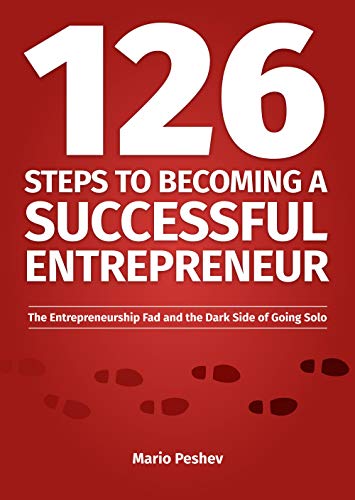Small businesses are booming in 2019 as full-time employment, as well as gig-economy ventures. The US Census Bureau reported 32,570,855 small businesses operating across the States. And, allegedly, every tenth American runs their own business. But a follow-up story discloses that 76.2% of businesses that had no employees accounted for merely 4% of SMB sales. As the memory of the 2008 financial recession fades away and stories arise of funded startups crossing the $1 billion mark, both regular workers and college students dream about running a successful business, relieved from the boredom of their corporate job or a life spent in a cubicle while paying off debts and mortgages.
Before entrepreneurs-to-be dive in, however, Peshev recommends investing in the knowledge of learning what the experience of being self-employed and running one’s own company is really like. 126 Steps to Becoming a Successful Entrepreneur paints a different portrait of the startup ecosystem and the reality of “being your own boss”. Peshev, a global WordPress influencer and business advisor, leading a multinational consultancy, reveals the reality of exchanging a 40-hour work week and a steady paycheck for 80-100 hours at the office for years to come, grinding through the struggles of generating sales, managing staff, juggling accounting and legal and designing scalable processes.
Q. Your book talks about the “dark side” of entrepreneurship….would you consider your book a warning to those considering their own business or a reality check and why?
M.P.: A “reality check” is a great way to summarize the philosophy behind the book.
The fad around entrepreneurship has long been taken to an extreme. Notable startup, business, finance magazines toot about major funding rounds, “overnight success”, and 16-year-old smart (yet extremely fortunate) kids making tens of millions of dollars.
These stories aren’t fake. But they haven’t been derived from a successful or repetitive business model that scales. Having the right idea in the right time, being born in a wealthy family that raised you around the Bay Area — factors that play a significant role in shaping your network and uncovering opportunities that aren’t broadly available.
My book relies on facts and statistics when it comes to opportunities. The “dark side” is merely a rational perspective of what it takes to be an entrepreneur and how this translates to abandoning a 9 to 5 job.
Q. Why do you think many aspiring entrepreneurs are more attached to the “dream” vs the reality of owning your own business?
M.P.: A “dream” is the best possible interpretation of “being your own boss” whilst the reality is: it’s still a job. Even the most romantic wantrepreneur can fathom the fact that founders still have to work, regardless of all the glamorous perks of organizing business meetings on your yacht and flying to Paris with your jet for a quick brunch with a business partner.
The corporate world is somewhat at fault here. Mismanagement, cubicles, endless meetings, internal politics, faceless employee development — factors that trigger passionate employees who want to get better and deliver value instead of dodging back-stabbers at the office. There’s more to this, of course, since this works in both ways, but expanding career opportunities in progressive companies would bridge the gap between the perception of enterprise vanity and the glamorous life of running your own show.
Q. What was the “darkest” moment you had as a new entrepreneur, and did you doubt your decision at that time?
M.P.: Plenty of them. Being clueless. False expectations. Burning through savings with no clear path to return on investment.
I was young and this lack of experience in life itself just hit twice as hard.
Taking loans from friends and cutting down on costs while working 80-100 hours a week, day and night. It made no sense in my head!
Later on, my second “darkest phase” was the epiphany around connections and available opportunities. With time and professional experience, certain unique opportunities get “unlocked”.
It’s nothing like a job interview competing on skills and qualifications. Instead, it entails a whole lot more: personal contacts, trust, unique traits that are hard to find, other mutual contacts that are beneficial, knowing the right people in the right circles, being able to map tech to marketing to product growth to finances in and out. The whole concept of “build it and they’ll come” vanished there.
Q. Your book has 126 questions…. do you have a favorite chapter and why?
M.P.: I have a sweet spot about #6, “Which do you prefer, being an entrepreneur or an intrapreneur, and why?” This entire disconnect between the corporate world and the entrepreneurial dream may very well be bridged by connecting talented and experienced individuals with progressive, evolved businesses in a need of creativity, passion, eagerness to change the world (having the right resources).
This is the very reason why large enterprises acquire businesses. Aside from intellectual property, human capital is the other most valuable asset of every company, often coming as the main one.
Q. Your book is informative yet shares a lot of your personal experiences. What’s one personal lesson you learned that you wished someone told you before becoming an entrepreneur that would’ve helped you better prepare?
M.P.: Elon Musk once said, “If you need inspiring words, you should not do it.”
What makes my book relevant is the added value while being controversial and in addition to sparking uncomfortable questions. Entrepreneurs who are truly determined to make it work will succeed, one way or another. Those who hesitate may at least take a step back for a while. But both audiences will be aware of certain challenges or discomforts in the startup ecosystem.
I had already heard most “best practices” before I started my journey. Without context, it doesn’t help a ton. And there are tons of mixed signals from friends who support you and family that’s afraid from you going nuts or losing your career and job prospects later. Adding more nuances to the story trains one’s critical thinking, an invaluable asset to surviving as an entrepreneur.
Q. Many young professionals graduating are capable of easily owning their own businesses given all of the opportunities of the gig economy. Would you advise young grads to try and go out on their own right away or try and build experience first working for others? Why?
M.P.: Acquiring practical experience is immensely helpful to beginners. This is why MBA programs often don’t work — you can’t magically manage people in teams you can’t quite assemble in industries you don’t get with business principles you haven’t encountered yet.
Take a job — any job you can. Study its business model. Learn what makes the founders, founders. Were they lucky? Did they inherit a small fortune? Or there was a story worth exploring further (a unique trait, a hidden opportunity, tons of hard work, multiple failures prior to this business.) Listen to your colleagues. Hear all the stories a boss would never hear due to their rank. Observe the hiring, training, onboarding processes.
You won’t have access to most of the essential details that make a business successful. But starting fresh with no former expertise whatsoever is simply gambling, that’s it.
Mario Peshev works to help SMEs and fast-paced startups with growth strategy and technological advice, automating internal processes, generating higher revenues through inbound marketing and technical solutions. He also advises professionals on career growth hacks and personal development. As Founder, CEO and WordPress Architect of DevriX, a featured international WordPress agency, he has worked with automotive and airline providers, media outlets generating 10M+ page views a month, LMS platforms and large multisite corporate platforms. As an entrepreneur and digital consultant, he has been published in Forbes, HuffPost, Inc, Entrepreneur, Business 2 Community, and Apple News, among others. Mario focuses the majority of his time on running his business and leading tech teams at DevriX with 30+ people crafting high-scale solutions that convert visitors to customers.











